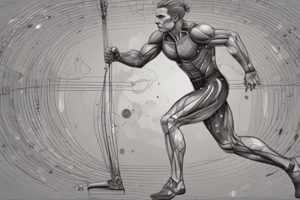Podcast
Questions and Answers
What is the Inverted-U Hypothesis?
What is the Inverted-U Hypothesis?
- Performance effectiveness will decrease as arousal increases without any limit.
- Performance effectiveness will increase as arousal increases without any limit.
- Performance effectiveness will decrease as arousal increases up to some optimal point, beyond which further decreases in arousal will produce an increase in performance.
- Performance effectiveness will increase as arousal increases up to some optimal point, beyond which further increases in arousal will produce a decrease in performance. (correct)
What is the difference between trait anxiety and state anxiety?
What is the difference between trait anxiety and state anxiety?
- Trait anxiety is an aspect of personality, while state anxiety refers to how an individual feels in the moment. (correct)
- Trait anxiety and state anxiety are the same thing.
- Trait anxiety refers to how an individual feels in the moment, while state anxiety is an aspect of personality.
- Trait anxiety is a positive emotional state, while state anxiety is a negative emotional state.
What is the Drive Theory?
What is the Drive Theory?
- Increased drive (arousal) will decrease the likelihood of dominant response or most usual behavior.
- Increased drive (arousal) will increase the likelihood of dominant response or most usual behavior. (correct)
- Increased drive (arousal) will have a random effect on the likelihood of dominant response or most usual behavior.
- Increased drive (arousal) will not have any effect on the likelihood of dominant response or most usual behavior.
What is somatic anxiety?
What is somatic anxiety?
What is the Individual Zone of Optimal Functioning (IZOF) Model?
What is the Individual Zone of Optimal Functioning (IZOF) Model?
What is the Multidimensional Anxiety Theory?
What is the Multidimensional Anxiety Theory?
What is stress?
What is stress?
What is cognitive anxiety?
What is cognitive anxiety?
What psychological skills can elite athletes use to maintain a facilitative interpretation of anxiety?
What psychological skills can elite athletes use to maintain a facilitative interpretation of anxiety?
According to the Inverted-U Hypothesis, what happens to performance effectiveness as arousal increases?
According to the Inverted-U Hypothesis, what happens to performance effectiveness as arousal increases?
What is the difference between trait anxiety and state anxiety?
What is the difference between trait anxiety and state anxiety?
What is the difference between cognitive anxiety and somatic anxiety?
What is the difference between cognitive anxiety and somatic anxiety?
What is the Drive Theory?
What is the Drive Theory?
What is the Multidimensional Anxiety Theory?
What is the Multidimensional Anxiety Theory?
What is the Individual Zone of Optimal Functioning (IZOF) Model?
What is the Individual Zone of Optimal Functioning (IZOF) Model?
What is the Catastrophe Theory?
What is the Catastrophe Theory?
What is stress?
What is stress?
What psychological skills do elite athletes use to maintain a facilitative interpretation of anxiety?
What psychological skills do elite athletes use to maintain a facilitative interpretation of anxiety?
Study Notes
Understanding Stress, Anxiety, and Arousal in Sports Performance
- Arousal is a blend of physiological and psychological activity in a person that varies on a continuum from deep sleep to intense excitement.
- The Drive Theory suggests that increased drive (arousal) will increase the likelihood of dominant response or most usual behavior. However, this theory has limited empirical support in sports performance.
- Under-arousal can cause athletes to underperform, while over-arousal can lead to stress, anxiety, and physical symptoms like increased heart rate and sweating.
- The Inverted-U Hypothesis predicts that performance effectiveness will increase as arousal increases up to some optimal point, beyond which further increases in arousal will produce a decrease in performance.
- Anxiety is a negative emotional state characterized by feelings of nervousness, worry, and apprehension associated with activation or arousal of the body.
- Trait anxiety is an aspect of personality, while state anxiety refers to how an individual feels in the moment.
- Cognitive anxiety is concerned with the extent to which one worries or has negative thoughts, while somatic anxiety is concerned with the moment-to-moment changes in one's perception of physiological activation.
- The Multidimensional Anxiety Theory predicts different relationships between different components of anxiety and performance, while the Catastrophe Theory focuses on the interactive effects of arousal, cognitive anxiety, and performance.
- The Individual Zone of Optimal Functioning (IZOF) Model suggests that the optimal level of arousal varies depending on an individual's skill level, personality characteristics, and the nature of the task being performed.
- Elite athletes are able to consistently maintain a facilitative interpretation of anxiety, especially through using psychological skills like goal setting, imagery, and self-talk.
- Stress is a process that occurs when people perceive an imbalance between the physical and psychological demands on them and their ability to respond.
- Recognizing the signs of arousal and state anxiety, such as cold, clammy hands or negative self-talk, can help athletes control pressurized situations and interpret their symptoms in a more facilitative rather than debilitative way.
Studying That Suits You
Use AI to generate personalized quizzes and flashcards to suit your learning preferences.
Related Documents
Description
Test your knowledge on the complex relationship between stress, anxiety, and arousal in sports performance with this quiz. From the Drive Theory to the Multidimensional Anxiety Theory, you'll explore different theoretical perspectives and learn about the impact of under and over-arousal on athletes. Discover the optimal level of arousal for different individuals and the psychological skills that elite athletes use to maintain a facilitative interpretation of anxiety. This quiz is perfect for athletes, coaches, and sports enthusiasts looking to deepen their understanding of the mental




